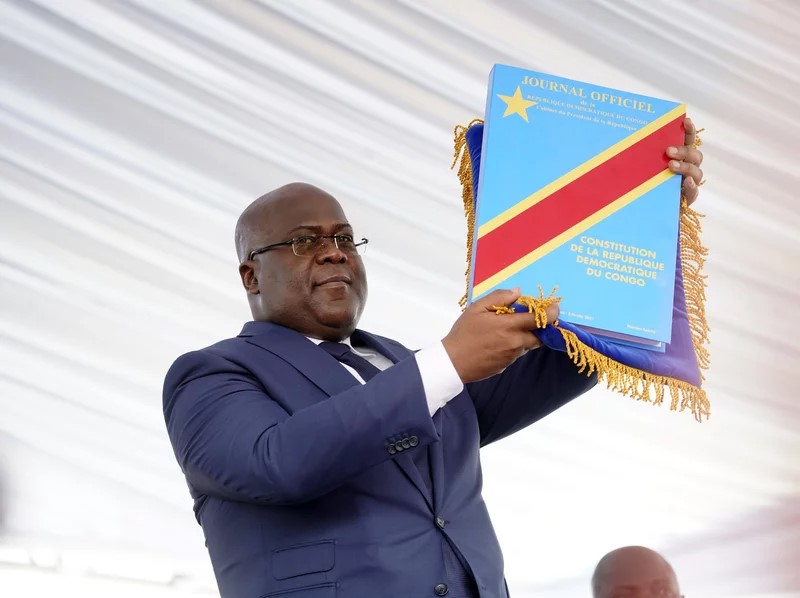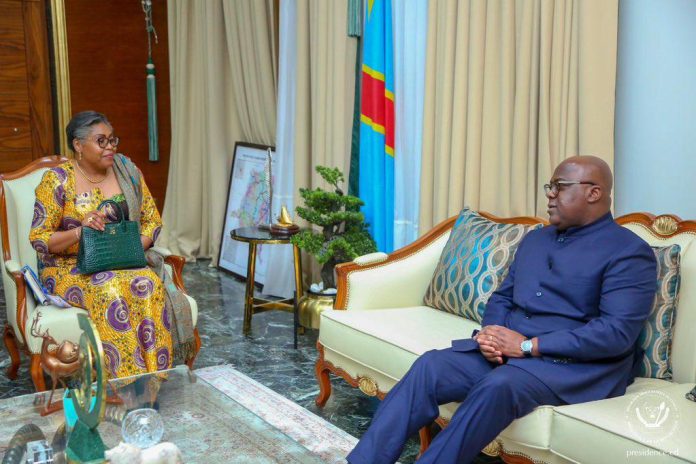The Democratic Republic of the Congo (DRC) finally has a government, several months after President Felix Tshisekedi’s victory in the December 20th election, which reelected him to a second term. His inauguration followed a month later, which was followed by the dissolution of the government after the Prime Minister resigned.
Missing Government
After the DRC’s December election, a problem arose with Prime Minister Jean-Michel Sama Lukonde. The PM had ran in the election to become a member of parliament. He won his seat in the election, and according to DRC law, he could not be an active parliamentary legislator while also being a government minister.
In accordance with this law, the PM resigned from the post of Prime Minister in order to focus on his duties as a parliamentarian. Following his resignation, much of the rest of the government resigned as well, prompting the dissolution of the government.
#RDC 20.02.2024|#Kinshasa
Après avoir remis sa démission au Président Félix Tshiskedi, le Premier ministre @LukondeSama a déclaré : " C'est une rencontre conviviale où le Président de la République a pris acte de cette décision. C'était pour nous une occasion de le remercier». pic.twitter.com/uhyFIAblhH— Présidence RDC ?? (@Presidence_RDC) February 20, 2024
President Tshisekedi placed Lukonde in charge of a sort of caretaker government with limited powers. On April 1st President Tshisekedi named a new Prime Minister, Judith Suminwa Tuluka. Tuluka, the DRC’s very first female Prime Minister. PM Tuluka did not officially replace Lukonde until Wednesday, May 29th.
PM Tuluka has named the new government, numbering 54 ministers, and is also expected to present her programme. Both the cabinet and the programme technically still require approval from the National Assembly, however are likely to be approved given the overwhelming majority that President Tshisekedi has, with 406 of the DRC’s 500 MP’s being aligned towards him.
While some of the ministerial positions have remained the same, several have changed hands, including some of the nation’s most important positions.
The DRC’s top diplomatic position, the Minister of Foreign Affairs, is now occupied by Therese Kayiwamba.
The Minister of Defence is now Guy Mwadiamvita, a close ally of President Tshisekedi and a member of his party, who replaces ex-warlord and former Vice President Jean Pierre Bemba. Bemba had previously spent 10 years in prison in The Hague, in the Netherlands, accused of crimes against humanity and war crimes. He was convicted in 2016 (after having spent eight years in prison awaiting his trial, and then verdict) by the International Criminal Court (ICC), before being released in 2018 after his verdicts were overturned after an appeal.
Bemba remains in government, instead having been placed as the Deputy Prime Minister of Transport.
Jacquemain Shabani, another close ally of President Tshisekedi, has taken up the mantle as the Minister of the Interior and Security.
The change of personnel in the Ministry of Defence and the Ministry of the Interior and Security are particularly notable given the recent coup attempt in the DRC, which took place on May 19th.
A Tumultuous Road Ahead
The Presidential Communications Director, Eric Nyindu, described the new government as “a mission team” which will work to “consolidate the achievements of Tshisekedi’s first term in office.” One of the missions Nyindu described was in job creation, meant to embolden the population of the DRC, the majority of whom live in poverty.
“The other mission of Judith Suminwa’s government is to diversify the Congolese economy; the government will have to give the Congolese people more purchasing power; guarantee greater security for citizens; facilitate access to basic services and speed up reforms in the civil service, in particular” -Presidential Communications Director Eric Nyindu
President Tshisekedi has an ambitious platform that is likely to be difficult to carry out. On top of promising to add 6.4 million jobs in his second term, Tshisekedi has also vowed to put an end to the insecurity which plagues the eastern DRC, a promise he was first elected upon in 2019.

This promise has proven to be the most difficult. Over 120 different armed groups operate within the North and South Kivu provinces, as well as the Ituri province. Rebel groups, criminal groups, ethnic militias, civilian defence groups, and more have made pacifying these areas seem impossible.
When she was chosen as Prime Minister, helping to end this insecurity was one of Tuluka’s vows, as it was Tshisekedi’s in his first election in 2019, and again upon his reelection in 2023.

